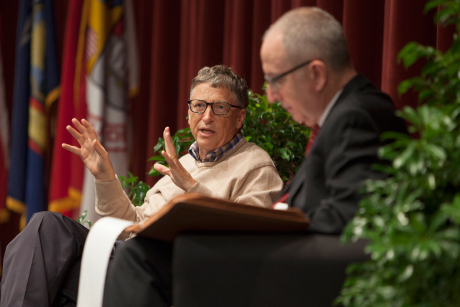Bill Gates talks with students on education, innovation
By Anne Ju

From higher education’s affordability problem, to the meaningfulness of student service trips abroad, to a balanced view of Washington politics, Bill Gates, visiting campus for the first time in a decade, touched on a little of everything during a public Q&A Oct. 1.
Earlier that day, the Microsoft co-founder and philanthropist attended the dedication of Bill & Melinda Gates Hall, Cornell’s new Computing and Information Science building, which was supported by a $25 million gift from the Bill & Melinda Gates Foundation.
With every seat in Bailey Hall filled, Gates joined Cornell President David Skorton on stage for a broad-ranging conversation fueled mainly by students. Approaching the stage, they peppered Gates with questions about philanthropy, software, education, innovation, what inspires him, and whether he can leap over a chair from a standing position (he thinks he still can, but didn’t demonstrate, for liability reasons, he said).
Regarding the pace of innovation today, Gates said computing and medicine are two areas from which he expects big things in the next 20 years.
“The fact that a computer will be able to see and listen and reason at a very significant level … that’s been the holy grail ever since I was 13 years old,” he said. “It turned out to be way harder than anybody expected.”
Inspiring students toward a philanthropic mindset, Gates endorsed the idea of student service trips, offered in abundance at Cornell.
Though a trip is just a trip, developing empathy for people in poorer parts of the world could make students into “thoughtful advocates” throughout their professional lives and beyond, Gates said. “That’s exactly what we need,” he said.
Gates also expounded on some of the problems faced by higher education today – not only its increasing costs, but also the sometimes ambiguous measures prospective students and employers use to evaluate schools. He took a slight jab at college rankings, which set up “perverse incentives” such as ranking schools higher for how much they spend per student.
One student asked Gates whether he thinks a few wealthy people or groups control the political environment and stall progress, to which Gates responded with temperance. It’s true that Congress has had difficulty reaching consensus on large issues like health care and immigration, but it’s OK, because progress won’t happen through politics, but through innovation, he asserted.
“The things that really count in society don’t depend on the politicians being geniuses,” he said. A major breakthrough in energy or medicine, he said, “trumps a lot of deadlock in Washington, D.C.”
Innovation was a common thread during the hourlong conversation. Controlling the cost of higher education, particularly for state schools, may be helped by innovations in technology. There’s some “idealistic thinking” around MOOCs (Massive Open Online Courses) addressing accessibility in education, but it’s not the answer, Gates said. MOOCs can’t replace the campus experience, just like most people don’t learn physics by reading a book.
Gates also offered simple advice to student entrepreneurs: Think of something radical.
Regarding what keeps him motivated, Gates urged students to do something they like and something in which they can sense progress – which describes his passion for charitable work.
And on the topic of success, it takes skill, surrounding oneself with smart friends, and finding something you love, but also a “ridiculous level of luck,” he admitted.
“I had no idea that writing software would be so profitable,” he said.
Media Contact
Get Cornell news delivered right to your inbox.
Subscribe